Ring-da-ding-ding-ding-ding-ding-ding...
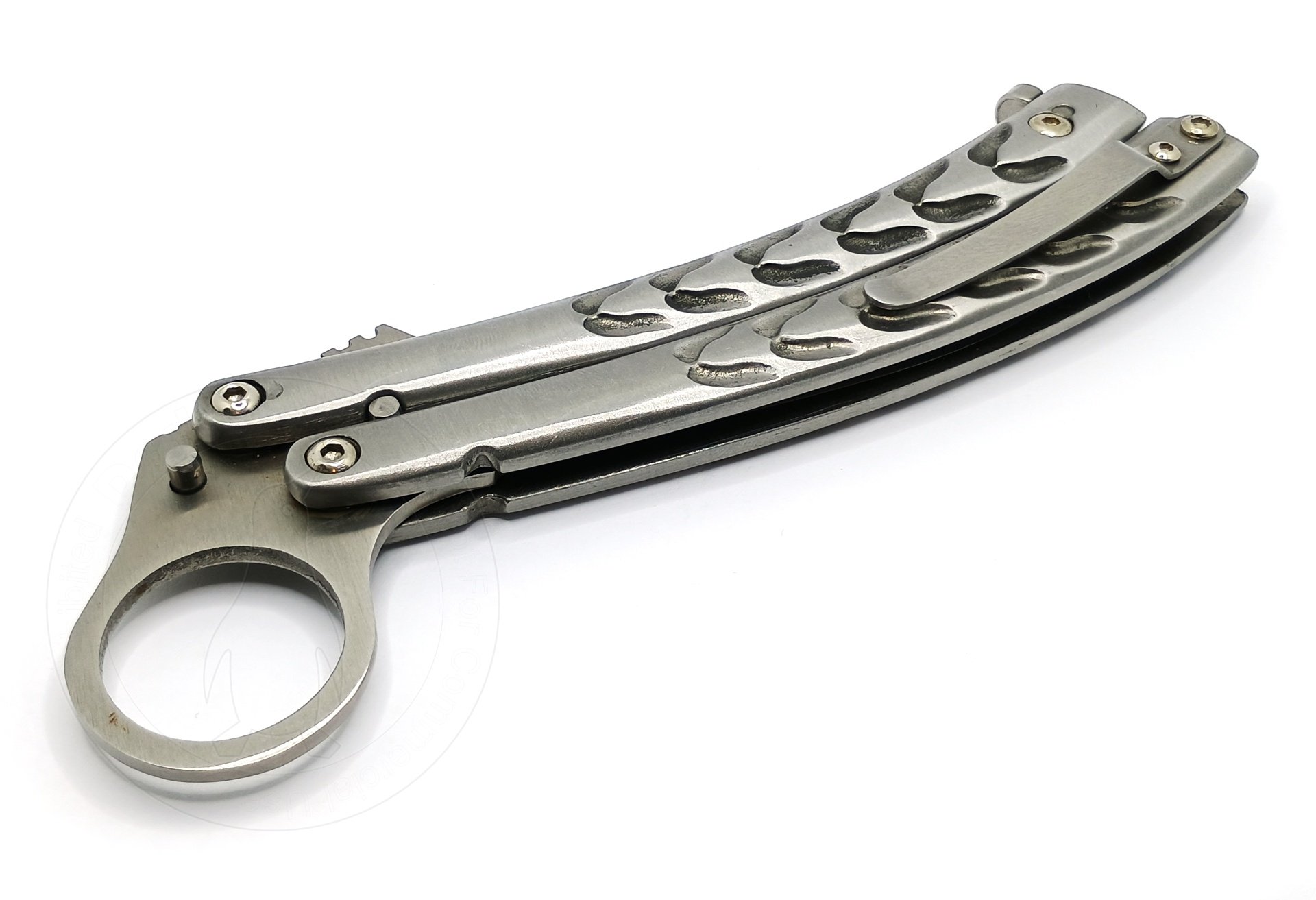
..bom-bom-baaaaaaoo.
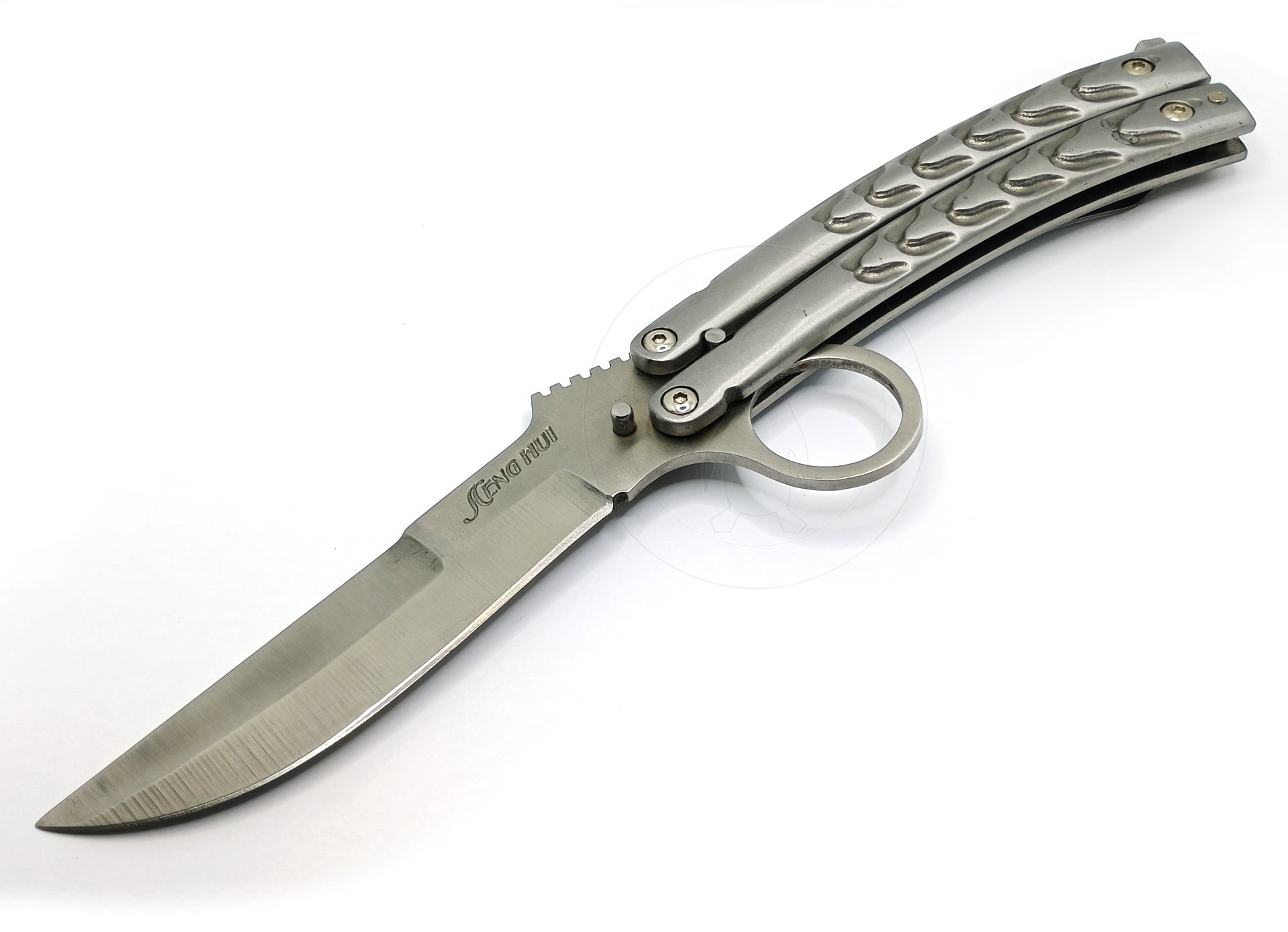
Usually when I show you guys this kind of malarkey I have to sheepishly admit to you that I have absolutely no idea who made it or where it comes from. This time, though, that's not the case. This knife was made by none other than "Heng Hui Hardware Industrial Co., Ltd."
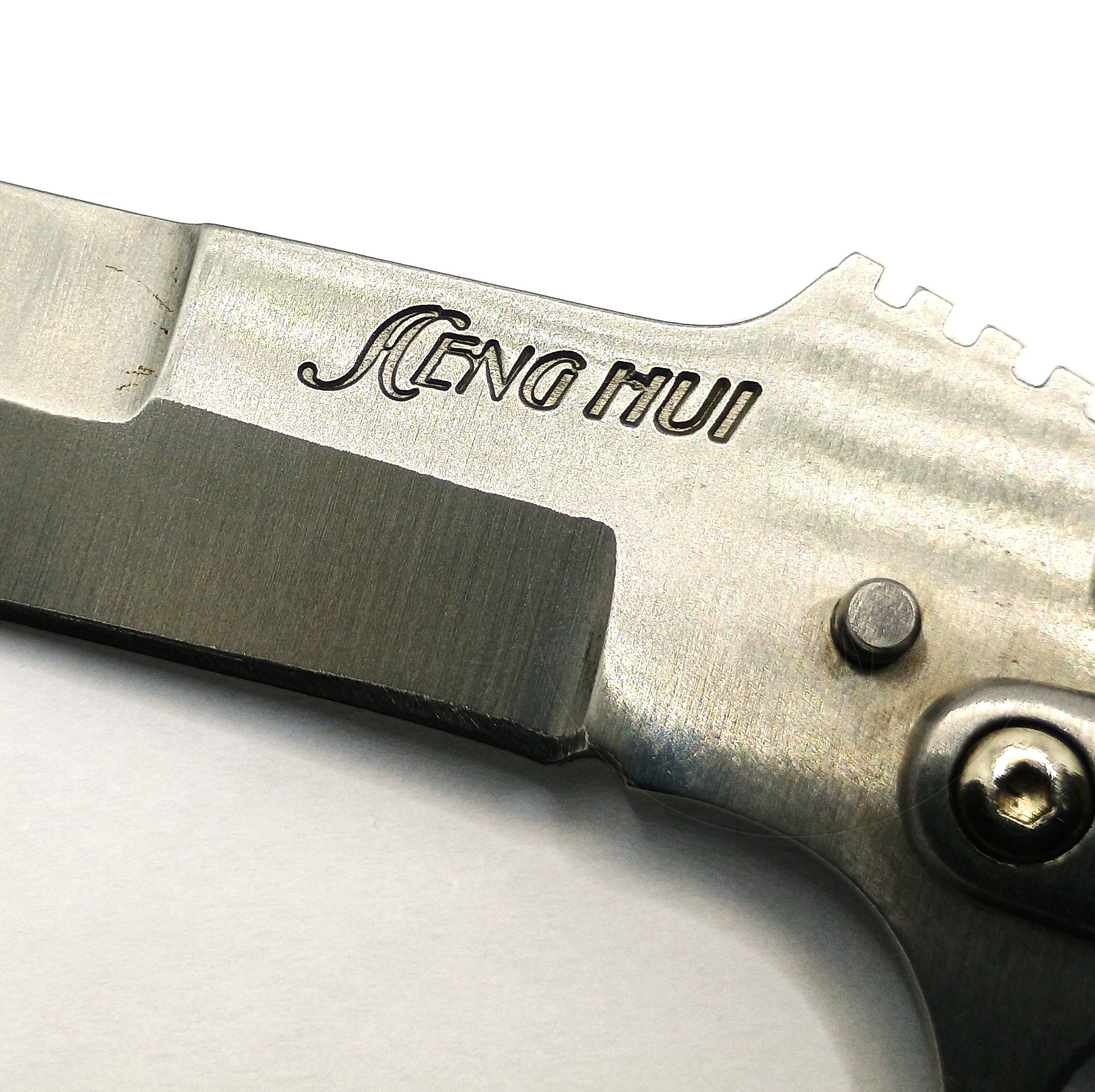
I know this because they were kind enough to stamp it into the blade.
I've probably owned this knife for going on 16 years at this point so in light of that you may be surprised to learn that Heng Hui apparently somehow still exist, and they're still cranking out chintzy knives, among other things. Nothing quite like this, though. Here is clearly their high water mark.
Our little tradition is not completely abolished, though. While I know with certainty who made this, I can at the very least tell you I don't know what its designation is. There's nothing else marked on it. I can't find this knife for sale anywhere anymore except here, which is in Czech, and it's labeled "Z3594." This may or may not be the manufacturer's designation or it might just be the SKU it's sold under on this particular site and therefore means nothing. On this point the internet remains silent, and the trail runs cold. But given that the URL calls it item "1660" instead I think the former is as good a theory as any. So I'm sticking with it. (And while we're at it, just get a load of those product photos. Phowar.)
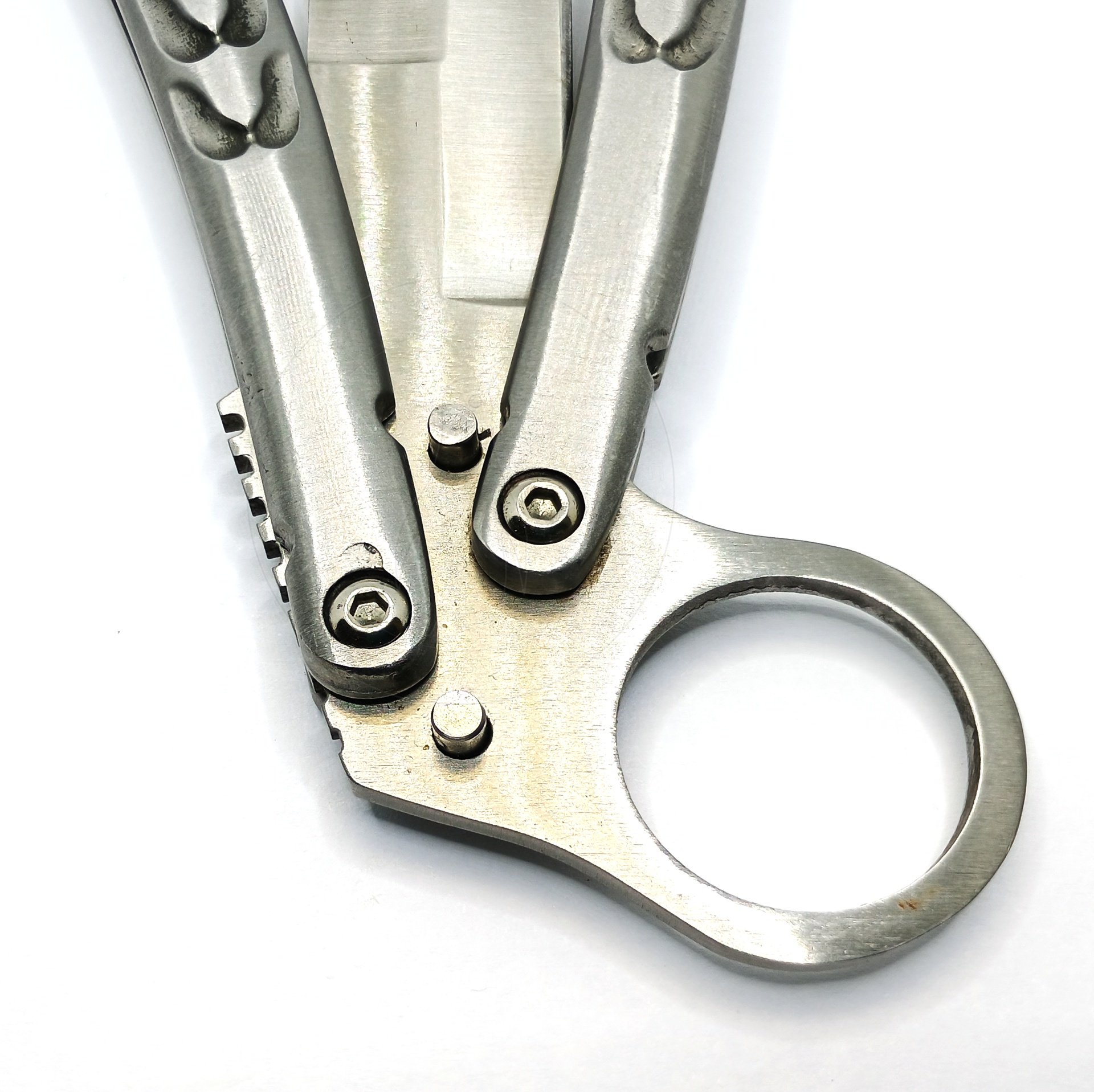
Regardless of what who is calling it where, the Z3594 is obviously a balisong knife. It's got one thing going for it, which is the rather hard to miss ring on the heel of the blade. Obviously I bought it for no other reason than this.
And I know what you're thinking.
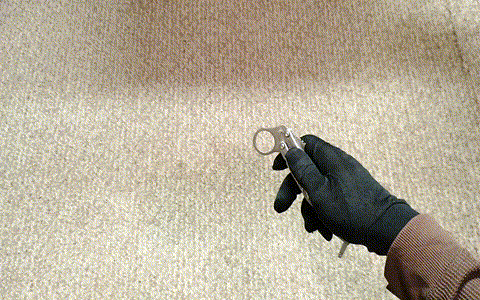
Yes, you absolutely can.
The ring is 0.890" in diameter 22.62mm, and it's easily big enough to get a thumb through. This is no dinky decorative drilling, barely suitable for sticking a lanyard through. No, it's large, ostentatious, and ready for you to grab this knife confidently by the scruff of the neck and ninja forth with it right the fuck into the night.

To assist in this, there actually is a pocket clip on the other side which is a surprising inclusion. As usual it's on the wrong side of the handle, but I can excuse it this time because it keeps the ring positioned away from your pocket seam, which realistically is the only way you're going to get this thing in your pants anyhow. And all that said, the clip works well and feels pretty good. I can't even come up with something incisive and sarcastic to say about it. It's fine.
You might think at first blush that the ring would get in the way when you're flipping this thing around, but it really doesn't. The Z3594 is actually competently designed in that respect, which is a thing that sounded much less absurd before I saw it written down just now. You'll note that the ring is actually positioned such that at rest it's on the bite side handle, which is not the one you're normally manipulating. The extreme curve throughout the whole knife allows the pivots to be very offset and that also keeps the ring out of your way during normal operation. Once you get the knife fully open, though, it's right there in the perfect position to get your index finger through.
Update: All of the above is surely because this knife appears to be a clone -- albeit not a perfect one -- of Terry Guinn's "Ring Fighter," which was a short production run semicustom (20 or 39 units, depending who you ask). Thus any design competency present is certainly borrowed.
And, competently designed is not to say that the Z3594 is competently made.
Because it isn't.
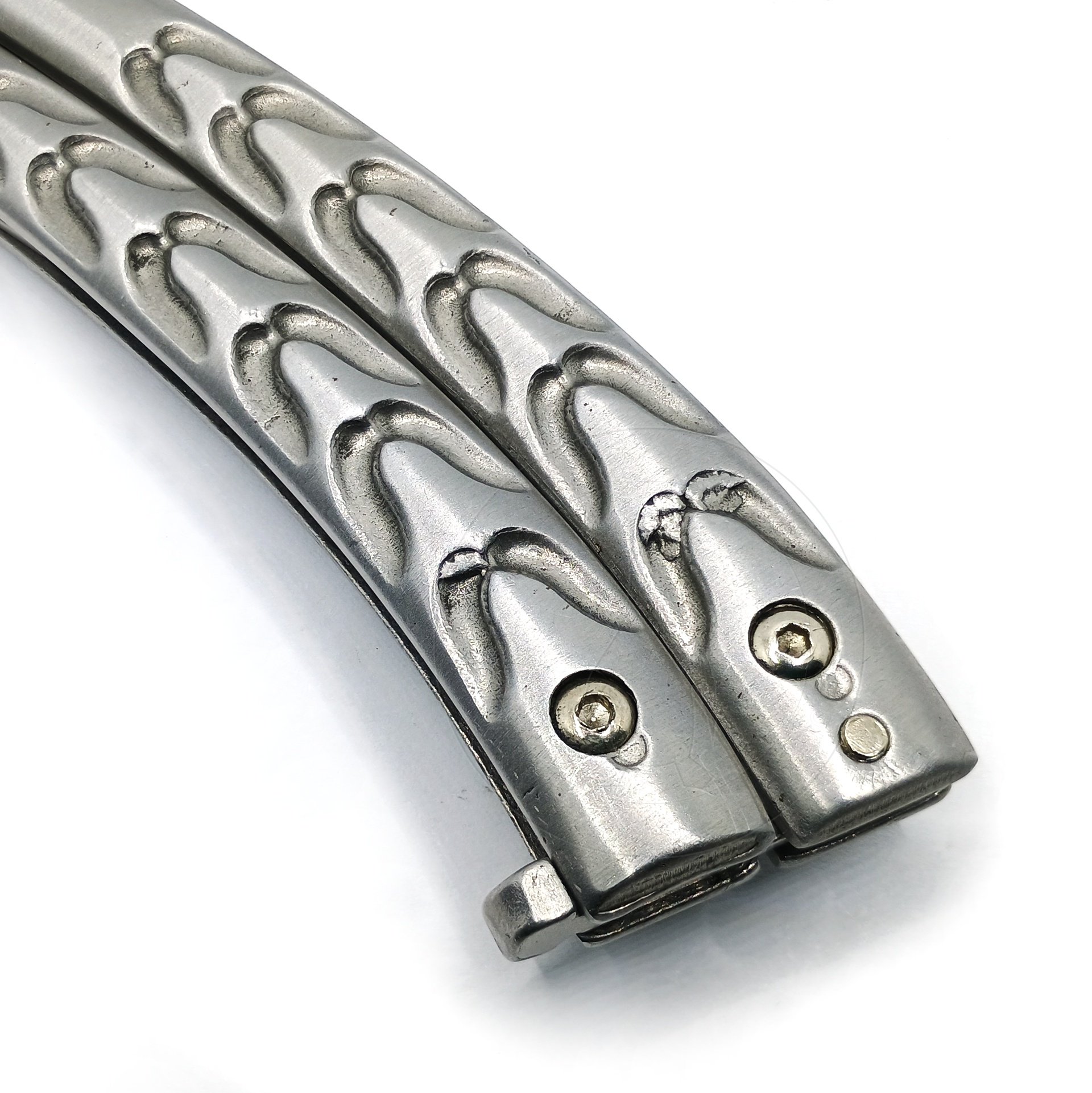
For instance, these casting flaws are really rather laughable. My granny could do a better job casting the metal in a pot on her stove.
I have no idea what that pattern is supposed to be, either. A row of bunny ears? Deer tracks? Kamina's sunglasses? Beats me.
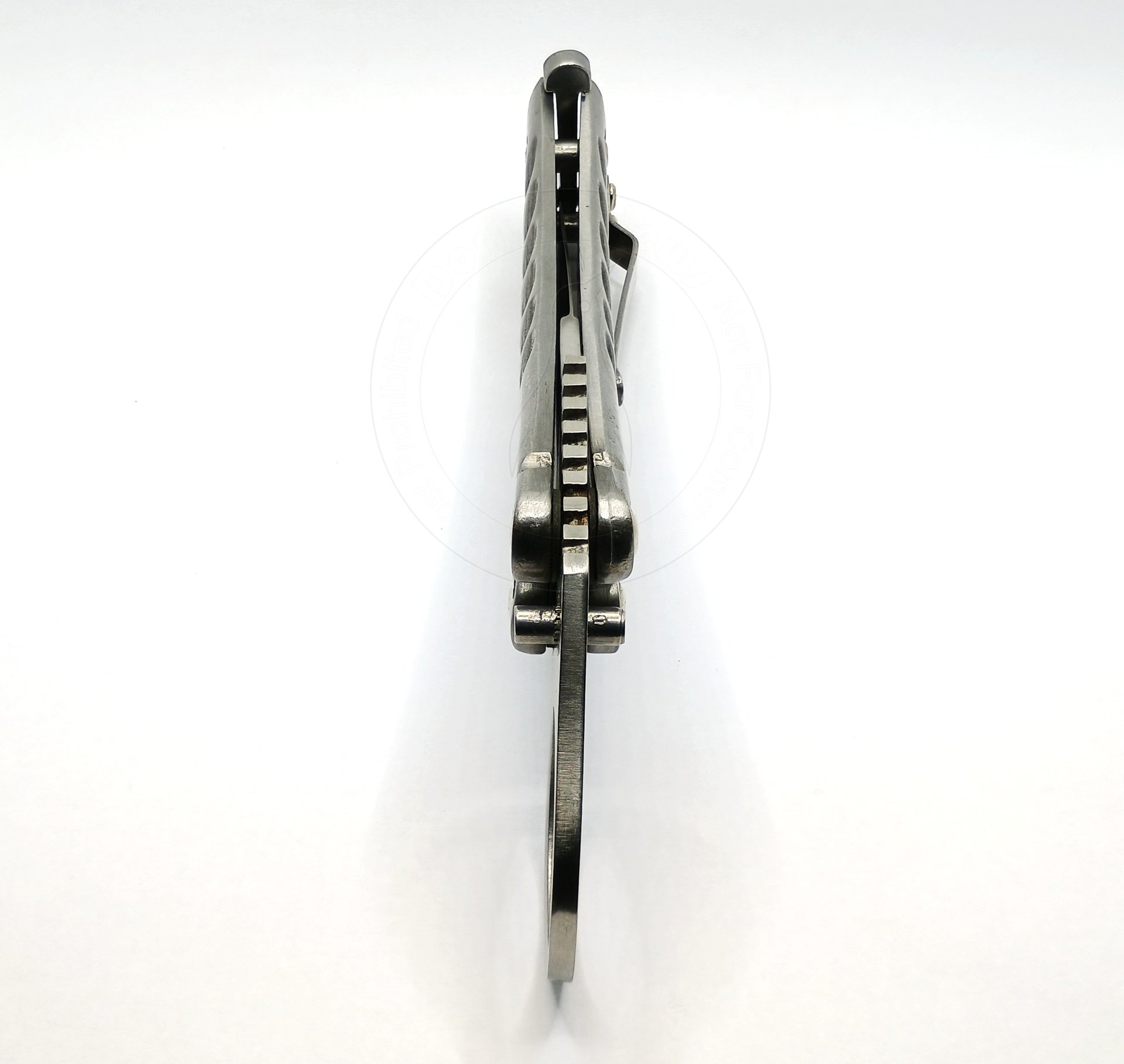
This is definitely a throw back to those good old/bad old days when every piece of Chinese cutlery you were able to lay your hands on could be counted on to be a source of never ending hilarity. The handle slabs are clearly cast, so it's a puzzle how they also managed to utterly fail to manage to be flat at least on one side. The tips of both handles where the pivot screws go through exhibit this pronounced flare, which can't be improved with any amount of dicking with the screw tension, no matter how hard you try.
Thus, then, as you would expect the pivot action is very, er, free. And it is, because the entire thing rattles like a pair of castanets. It's a red letter day indeed when I can say that a balisong fails so hard at the wiggle test...
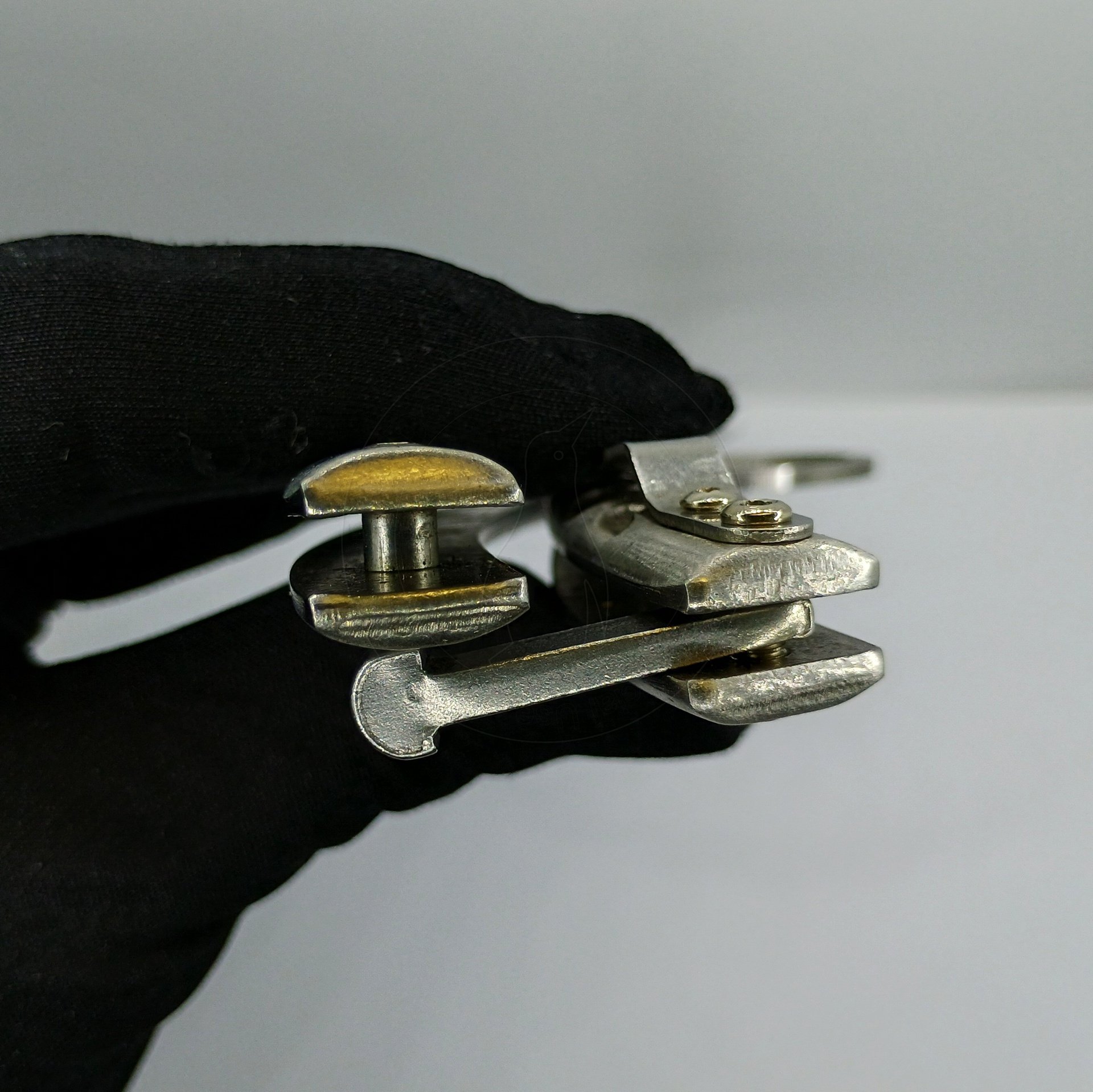
...That it's not only possible but downright trivial to cause the latch to miss the opposite handle entirely.
But never mind the quality. Feel the price. I don't know how much I paid for this back in the day, but it was surely less than $10. You couldn't pry my wallet open for anything more even if you had a crowbar ninety feet long.
Of course anywhere there is machine work it is visibly crude. There are no sharp edges on the metalwork other than the cutting one, the one that's supposed to be there, but as an example the inner surface of the ring is more than a bit rough and I'm convinced its shape is actually stamped rather than milled. It works well enough, but feels distinctly unrefined and could probably benefit from with a pass with a Dremel -- a job which I've been putting off for all these years. And plan to continue to do so.
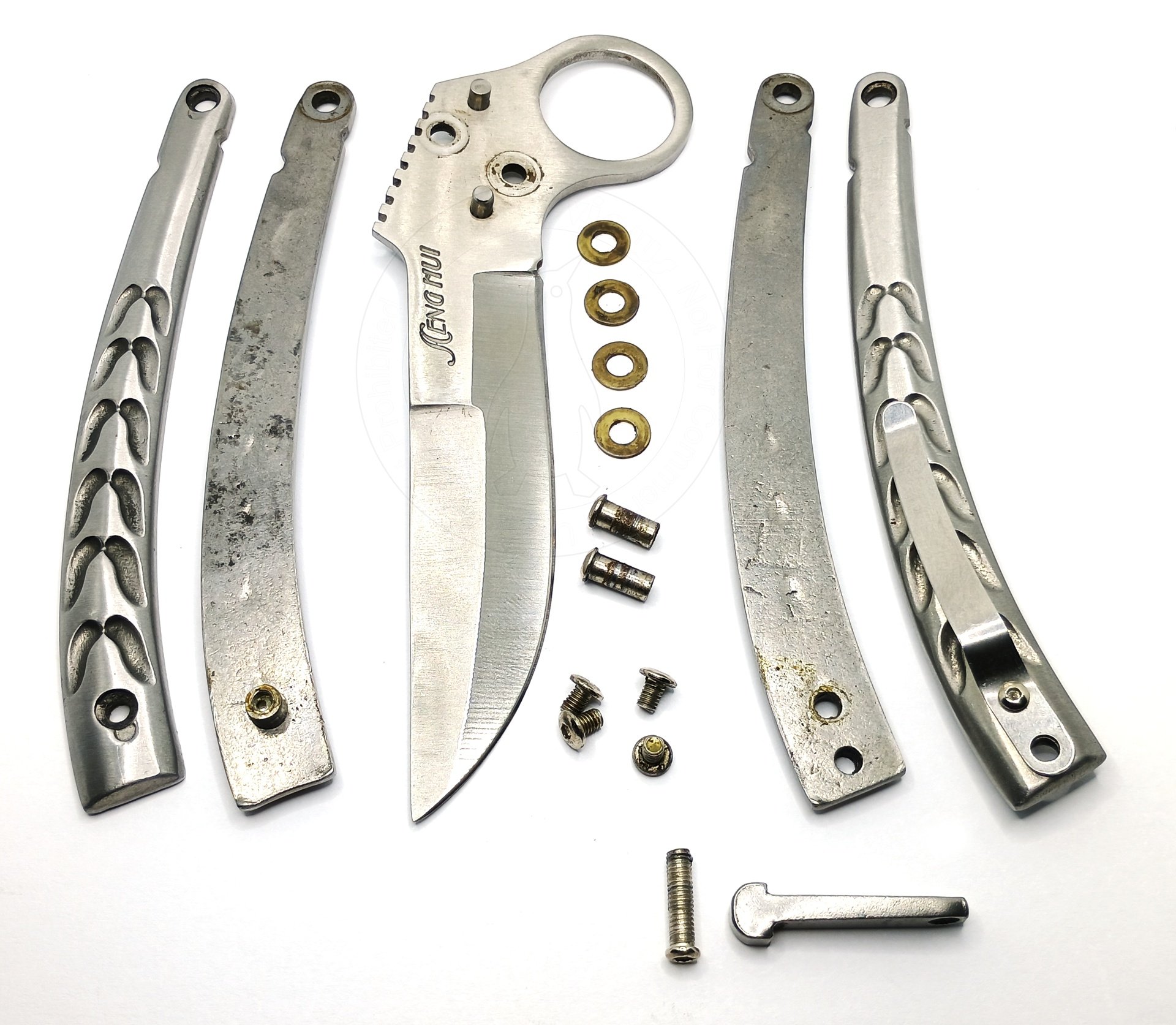
Since I have a reputation to uphold around here I think I am obliged to provide you the above, so I did. For archival purposes, I left all of the components exactly as filthy as they were when delivered.
The Z3594 actually wasn't too tough to take apart at least to the point you see here. This despite its best efforts, up to and including all of its screw heads being not Torx like we've become accustomed to, but rather Allen heads which manage to not quite properly fit any size bit I own -- neither metric nor fractional inch.
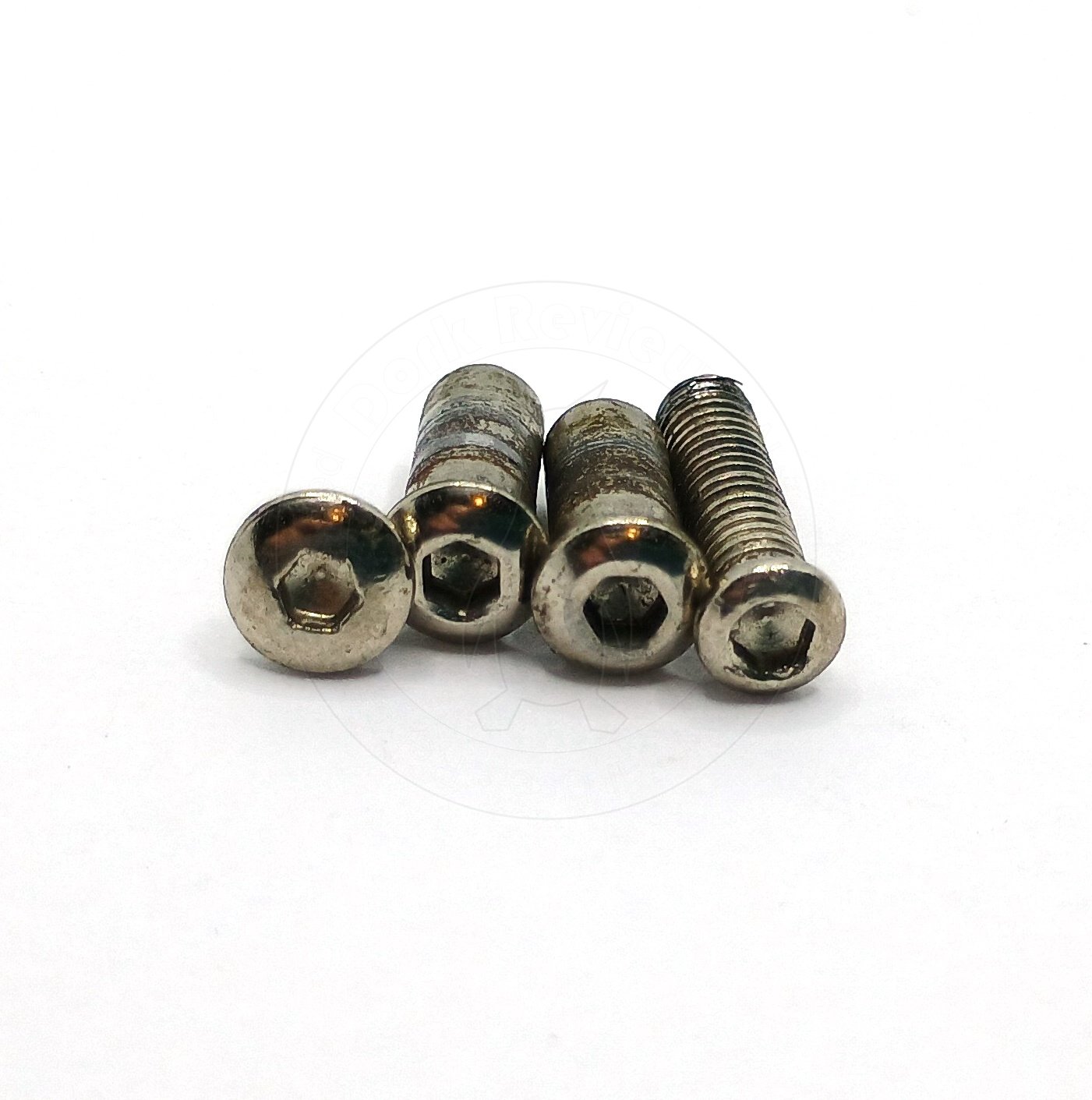
The screws came prefastened from the factory with one of only two torque values: Finger-tight, or irrevocably cranked. Luckily for us, enough of them were the former that I was able to get all four handle slabs apart and extract the blade. The knife is spaced out by two Chicago screws forming the pivots, and one simple threaded barrel on each handle, down towards the tail. Among the screws that would not come out were one of each of the spacer screws, and one but not the other of the screws holding down the clip -- which helpfully arrived pre-stripped from the factory.

Here's a lineup of... most... of the hardware. No fancy features are evident whatsoever. No anti-rotation flats on the pivot screws, no fancy decorative screw heads, no springs, not even any pins.
The blade rides on what are easily the grimiest plastic washers I have ever seen in my life. At first glance I thought whatever is all over them might be graphite, if we could be so lucky, but I think in reality it's just dirt. Some of it could be cleaned off. Most of it couldn't.
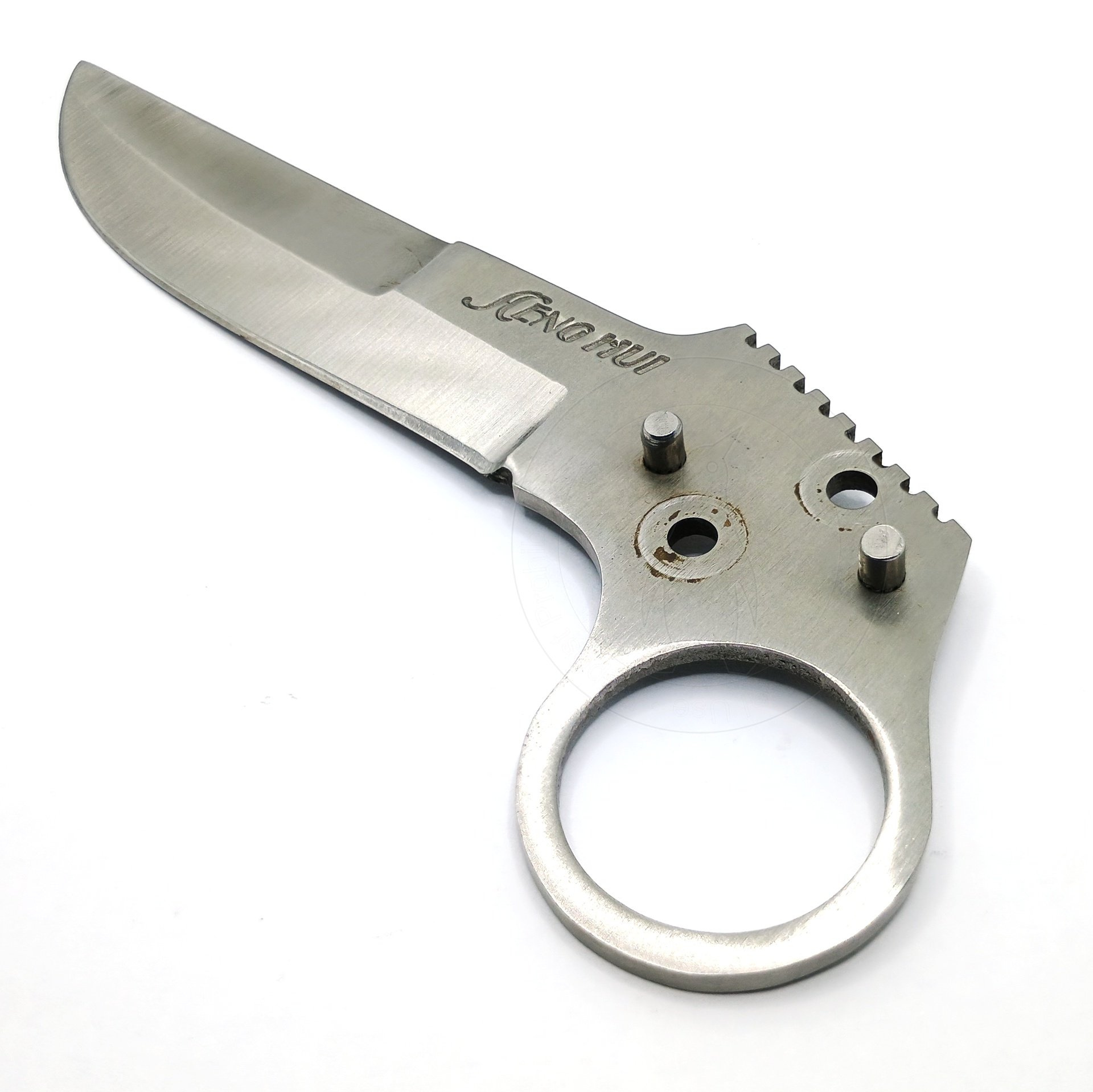
The blade works thusly, and when it's dismounted you can see how offset the pivot points are from each other to accommodate the high Banana Quotient present in the assembled knife. Strangely, the press job on the kicker pins is actually pretty good -- among the better examples I've seen on flea market grade cutlery, actually. Weird.
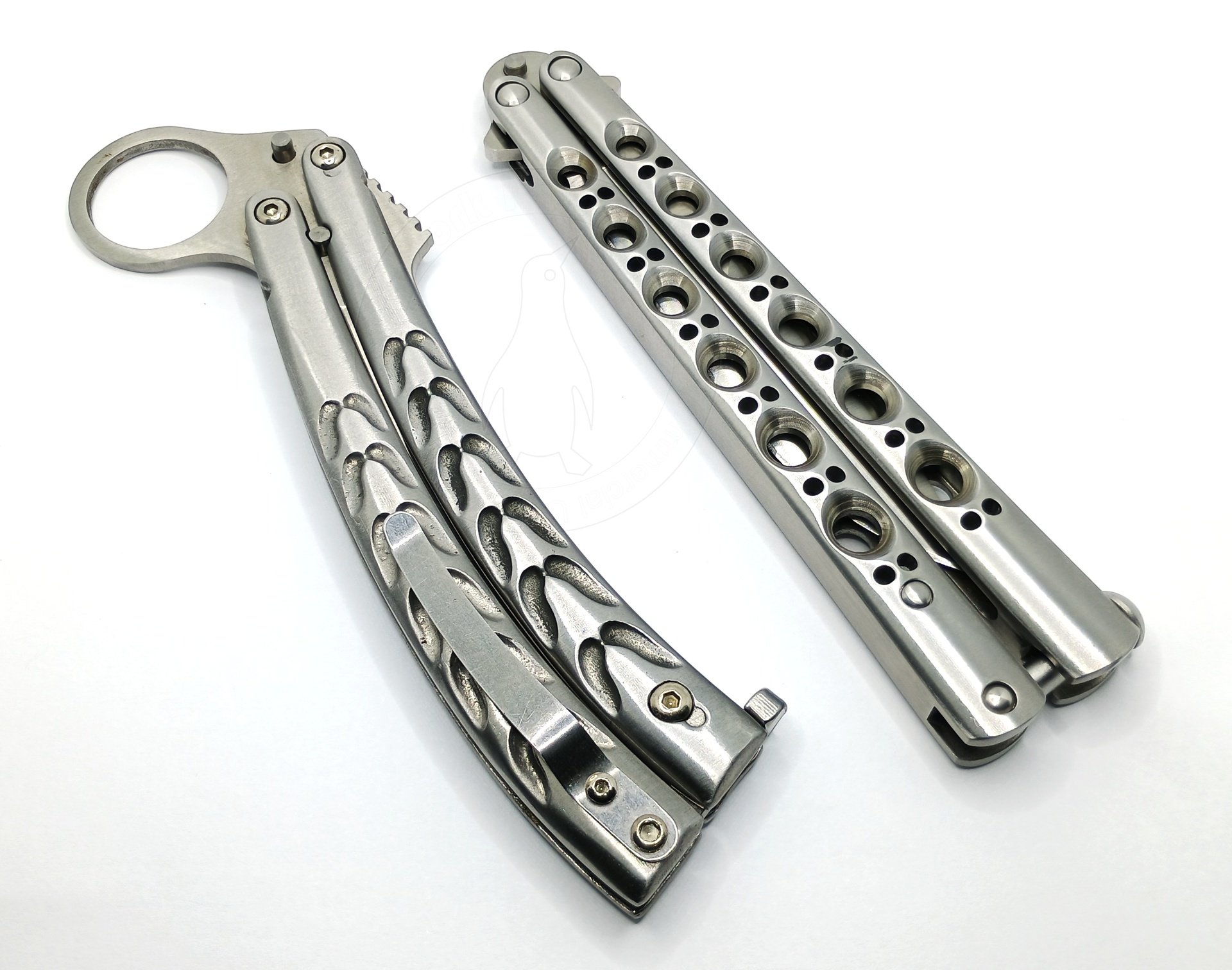
Above: You, versus the guy she tells you not to worry about.
The Z3594 probably wishes it were a Benchmade Model 42. It's probably got pinups of it all over its room, and spends all afternoon listening to Depeche Mode and Morrissey while wistfully gazing into a mirror at itself and halfheartedly doing curls using weighs made of balsa wood and leaded Chinese paint, dreaming one day it might grow up to be half as good.
Proportionally, it looks as if somebody took a Model 4x, clamped it in a vise, and whacked it with a hammer until it bent. From the tip of the tail to its forwardmost kicker pin, it's almost exactly the same length as from the tail of a the Model 42 to its tang pin. That can't be a coincidence.
All in, the Z3594 is precisely 6" long. Open it's 9-1/8", and the taking of both measurements is confounded in no small part by the radical curvature in it when it's both open and closed. The blade is 3-15/16" long measured from the tip of its scimitar-like profile to the forwardmost point on the nearest handle, with the one near the edge winding up noticeably closer to the front than the other one by the time it's open. The blade is 0.098" thick or 2.51mm, and is made of an unspecified alloy which is presumably stainless. Being entirely of low-tech materials, it weighs a not inconsiderable 197.8 grams or 6.98 ounces.
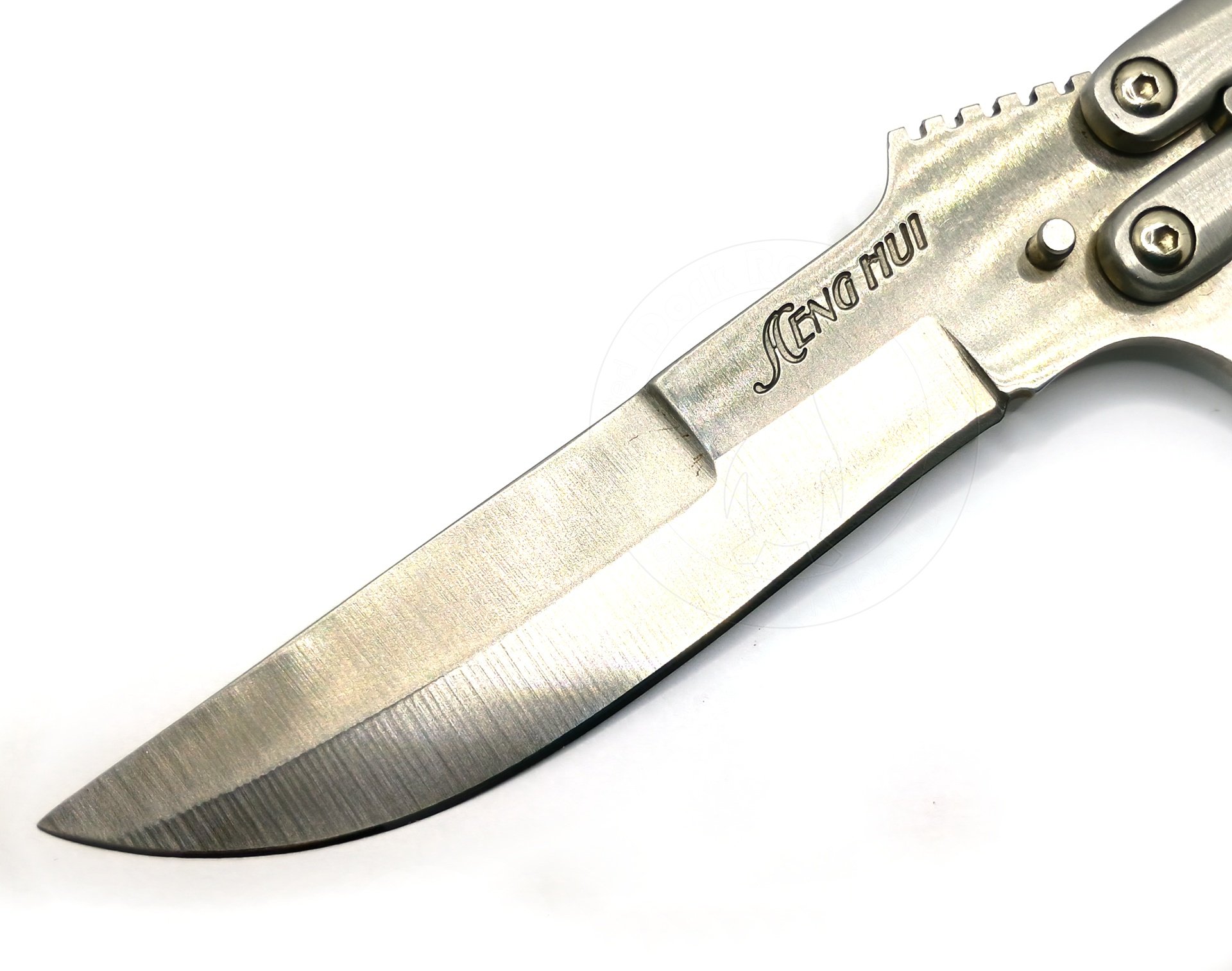
The taper is hollow ground -- the cheapest kind of grind, of course -- and exhibits those ratty old machine marks we all know and love by now. I can't say anything about the edge because mine is not original. Perhaps unwisely, I elected to sharpen mine some years ago. I didn't put a lot off effort into it but alas, what was once the crude and sawtoothy original factory edge is now lost to time forever. However shall we cope.
The Inevitable Conclusion
There is a Venn diagram. On the one side, the Illustrious Pantheon of Knives with Cool Rings In Them. On the other, objects purporting to solve problems that most likely don't actually exist. Somewhere in the middle rests this knife. I couldn't tell you exactly where.
"Hey kid, do you find your balisong knife too hard to hold onto? Of course you do, nerd, that's the point!"
So maybe it's not built very well. But despite everything stacked up against it, the little Heng Hui actually manages to do something kind of special: In the world of balisong knives, it brings something genuinely new to the table. The ring might be silly but so are balisong knives in general, really, when you step back a bit and look at it. I won't go so far as to say that there are "myriad" ways you can use the ring to add to your repertoire of spinning tricks but there are certainly at least few, and thus there are things you can do with this that you can't do with most other balisongs. That's got to count for something.
It's just a shame that it's... you know.
Crap.
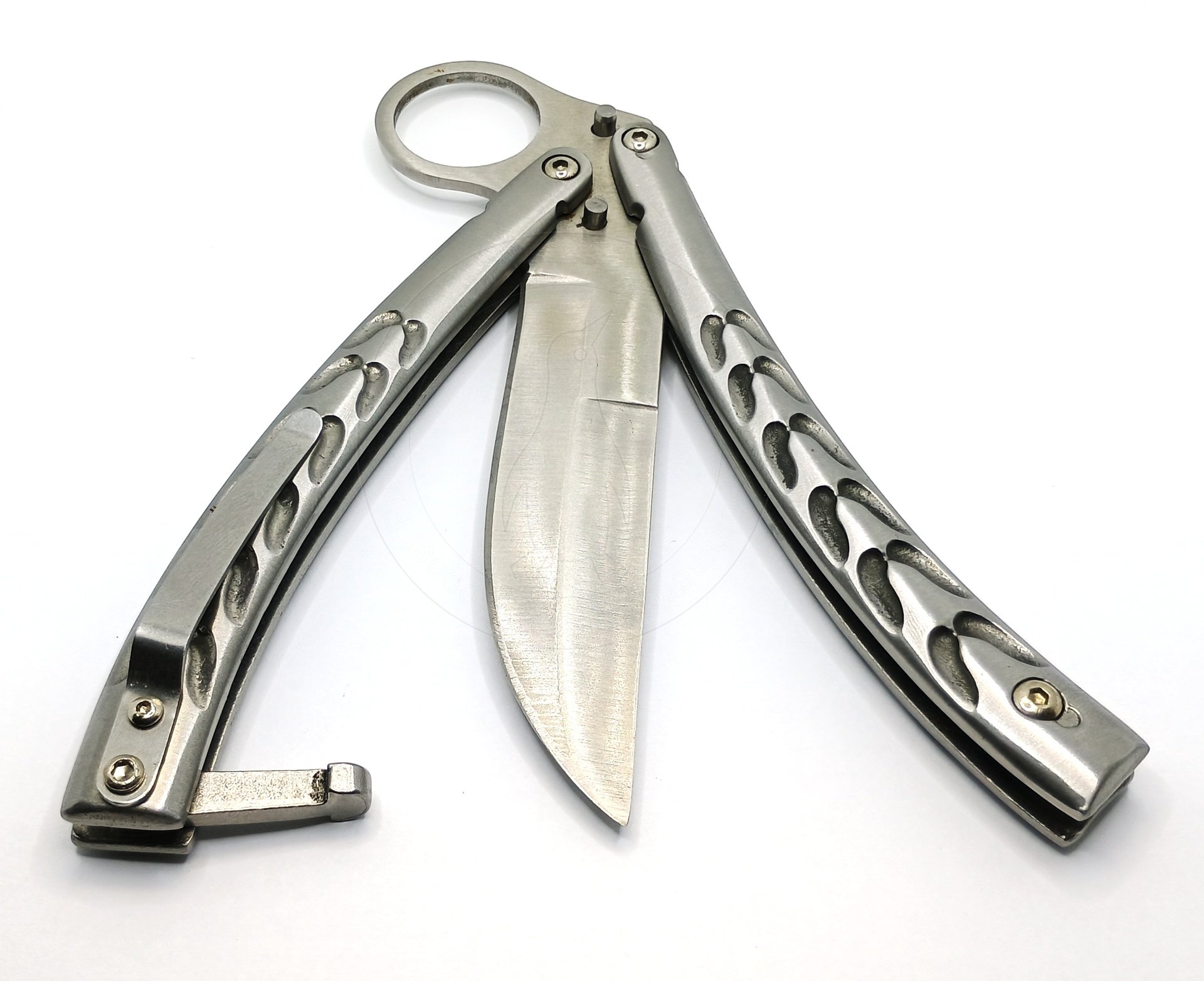
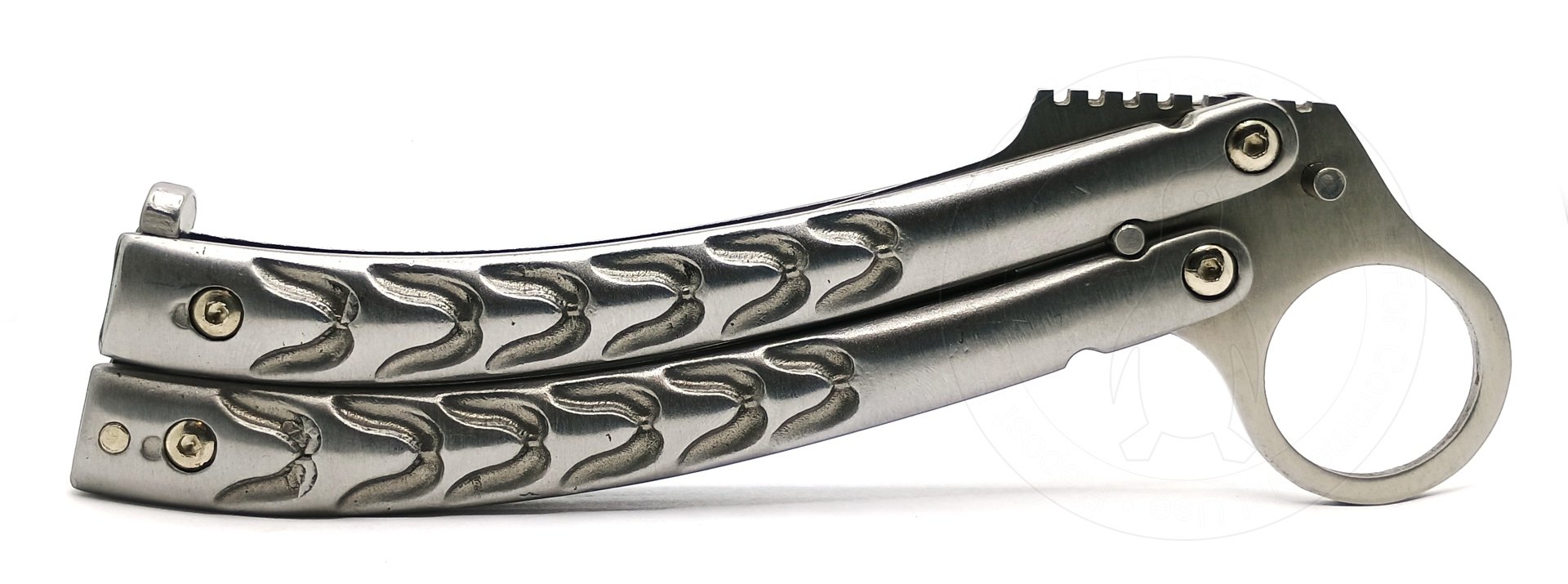
😱